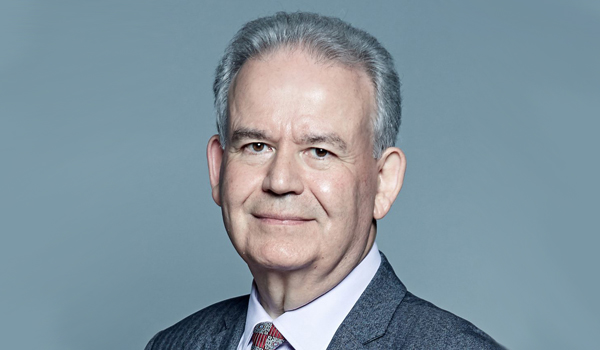‘Concerning police vetting process’ risks ‘insider threat’ from extremism, warns report
The Intelligence and Security Committee (ISC) has warned there is risk to policing from the ‘insider threat’ of right-wing extremism because of a “concerning lack of thorough background checks”.
It said this issue was brought into ” sharp focus” in April last year, when Metropolitan Police Service officer Ben Hannam was jailed for four years and four months after being convicted of membership of National Action – the first serving British police officer to be convicted of a terrorism offence.
During Hannam’s trial it had emerged that there were indications of his extremist beliefs while he was still at school and just two days before he applied to join the force had appeared in a neo-Nazi propaganda video.
The committee was told that Hannam had undergone the same checks as other recruits applying for the police, and that “current vetting processes would not have picked up his membership and interest in National Action”.
Hannam’s extremist activity was eventually picked up through a data leak from the extreme right-wing forum Iron March.
In its report on extreme right-wing terrorism published on Wednesday (July 13), the ISC said: “There appears to be an issue around the current vetting processes for candidates applying to join the police – the lack of thorough background checks is a matter of concern
“As the internet and the wider online sphere is the key driver of the extreme right-wing terrorism threat, it follows that online activity must be closely scrutinised when the police are assessing whether an individual is suitable to join its ranks.”
The ISC said it was told by Counter Terrorism Policing (CTP) that for the police to have picked up Hannam, without having detected that data leak, at the point of entering the police, they would have needed to complete “an extensive search of his internet activity and IP searches”.
It added: “We were told that this has not, to date, been done routinely for individuals joining the police, on the grounds that the resource and privacy implications are ‘quite enormous’. [However] the police are now actively considering this additional measure, although [they] caveated that ‘reality being… people don’t like the idea that their whole internet history is going to be looked at as part of their application for a particular job’.”
The ISC said the risk of radicalisation was highlighted in a 2020 report published by Her Majesty’s Inspectorate of Constabulary and Fire and Rescue Services on the contribution being made by the police to the Prevent programme.
The report noted that “few staff we interviewed had considered the possibility that their staff could be vulnerable to radicalisation”.
However, CTP told the committee’s inquiry that the police were “aware of the potential for those within policing to be exposed to, and influenced by, right-wing extremist ideologies, and that this risk could stem from officers and staff being exposed to influencing factors in their routine lives, or from enhanced exposure to extremist content due to their specialist roles”.
It said a number of measures were in place to address these potential vulnerabilities, including: mechanisms for officers and staff to discreetly report concerns about colleagues, which would then be subject to further investigation; and enhanced levels of vetting for sensitive posts.
The ISC’s report said the threat from extreme right-wing terrorism was on “an upward trajectory” and increasingly being driven by the internet.
The ISC said there has been a marked shift in the age, demographic and backgrounds of those associated with ideology.
“The threat is now fragmented and complex, increasingly driven by the internet and characterised by a technologically aware demographic of predominantly young men, who are typically ‘self-initiated terrorists’,” it said.
The report said few belong to organised groups, making them difficult to identify and monitor. It added: “Their motivation can be highly individualistic, according to their particular personal circumstances, the nature of their grievances and perceptions of their own capabilities – determining how, why and when they may choose to attack is therefore particularly challenging.”
ISC chair Dr Julian Lewis MP said: “There are reports that groups and individuals have sought to co-opt the Covid-19 pandemic, using conspiracy theories and exploiting grievances to radicalise and recruit.
“While the full impact of the global pandemic has yet to be seen, we are assured that the intelligence community and the police have recognised the impact that events such as the pandemic and the Black Lives Matter protests may have had on the extremist beliefs of individuals and the possibility that this will lead to an increase in the threat.”
The number of extreme right-wing terrorism investigations, disruptions, and self-initiated terrorist referrals all increased steadily since 2017.
Of the 25 attacks prevented by the intelligence community and CTP between March 2017 and January 2020, eight (just under 30 per cent of the total) were motivated by an extreme right-wing terrorism ideology.
The report said because extreme right-wing terrorists “tend to be tech-savvy”, they typically use encrypted platforms, virtual private networks and ‘dark net’ sites, with the head of CTP telling the committee that “end to end encryption is a disaster”. MI5 has called on communications service providers (CSPs) to allow the intelligence agencies to have “exceptional access to encrypted messaging”. It is important to ensure that alternative arrangements are put in place to avoid potential loss of access to key capabilities, said the report.
It added: “The CSPs must ensure that this material cannot be viewed and shared in the first place. The ISC first identified this problem in 2014, but little progress has been made since. Whilst the major CSPs may be finally taking steps, the smaller organisations appear reluctant to do so.
“Technology and ease of communication mean that extreme right-wing terrorism is a threat without borders. International cooperation is important in tackling extreme right-wing terrorism, but the disparities in approach and legal thresholds make this challenging.”


